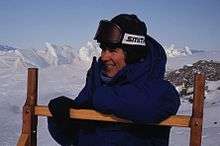Margaret Bradshaw
| Margaret Bradshaw | |
|---|---|
 Margaret Bradshaw in Antarctica | |
| Nationality | New Zealand |
| Fields | Geology |
| Institutions | University of Canterbury, Canterbury Museum |
| Notable awards |
Polar medal Royal Society of New Zealand Science & Technology Medal |
Margaret Bradshaw is a British-born New Zealand geologist and a retired staff member at the University of Canterbury.[1] She is considered a trail blazer and influential female role model in Antarctic Research.[2]
Early life and education
Bradshaw was raised in Nottingham, England and moved to Christchurch, New Zealand, in 1966.[3] Bradshaw began her work there on Devonian invertebrate palaeontology, gradually incorporating Antarctica into her research.[4]
Career and impact
Bradshaw focused her research on the structure and stratigraphy of Devonian rocks in New Zealand and Antarctica. Specifically she worked on the development and relationship of Paleozoic terrains in New Zealand, as well as the paleobiogeograpy of Devonian Bivalves and the Paleontology and environmental significance of Paleozoic Trace fossils in both New Zealand, Antarctica and Australia. Bradshaw was a curator at the Canterbury Museum and her initial trips to Antarctica were to collect fossils and rocks for the Antarctic display.[4]
Bradshaw was the curator of Geology at the Canterbury Museum for 17 years.[3][5] Her first trip to Antarctica was from 1975 to 1976 to collect specimens for the museum's Antarctic Hall.[3] Bradshaw was the first woman to lead an Antarctic deep field party in her 1979 to 1980 field season to the remote Ohio Range[6] and she was the first to discover new fish fossils in the exposures of the Cook Mountains in her 1988 to 1989 field season.[4]
Bradshaw Peak, situated on the south west side of the McLay Glacier in Antarctica, is named in her honour.[6] Bradshaw was the president of the New Zealand Antarctic Society for 10 years until 2003.[7] She is a member of the Association of Australian Paleontologists.[8]
Awards and honours
Bradshaw is the second woman to win the Queen's Polar Medal, and the first New Zealand woman to be awarded this medal, in 1993.[9][10] She received the Royal Society of New Zealand Science & Technology Medal in 1994.[11] Bradshaw is a New Zealand Antarctic Life Member, nominated in 2006.[12]
References
- ↑ "Dr Margaret Bradshaw". geol.canterbury.ac.nz. University of Canterbury. Retrieved 11 July 2016.
- ↑ "Intrepid women share Antarctic experiences at NZ IceFest". scoop.co.nz. Retrieved 11 July 2016.
- 1 2 3 "SIOV 2002: The Voyage". farvoyager.com. Retrieved 11 July 2016.
- 1 2 3 Long, John (1 March 2001). Mountains of Madness: A Scientist's Odyssey in Antarctica. Joseph Henry Press. ISBN 978-0-309-07077-5.
- ↑ "Pallets of equipment and supplies being delivered by Hercules". Antarctica NZ. Retrieved 11 July 2016.
- 1 2 "Bradshaw Peak". Australian Antarctic Data Centre. Retrieved 18 July 2016.
- ↑ "Antarctic". antarctic.org.nz. Retrieved 11 July 2016.
- ↑ "Margaret Bradshaw". docs.exdat.com. Association of Australasian Palaeontologists. Retrieved 11 July 2016.
- ↑ Mills, William James (1 January 2003). Exploring Polar Frontiers: A – L. ABC-CLIO. ISBN 978-1-57607-422-0.
- ↑ "Polar Medal". antarctic.org.nz. Retrieved 11 July 2016.
- ↑ Riffenburgh, Beau (1 January 2007). Encyclopedia of the Antarctic. Taylor & Francis. ISBN 978-0-415-97024-2.
- ↑ Cadenhead, Natalie; Bray, Janet, eds. (2010). "Antarctic" (PDF). The Magazine of the New Zealand Antarctic Society (pdf). Vol. 28 no. 211. Gusto. ISSN 0003-5327. Archived (PDF) from the original on 30 June 2016. Retrieved 18 July 2016.